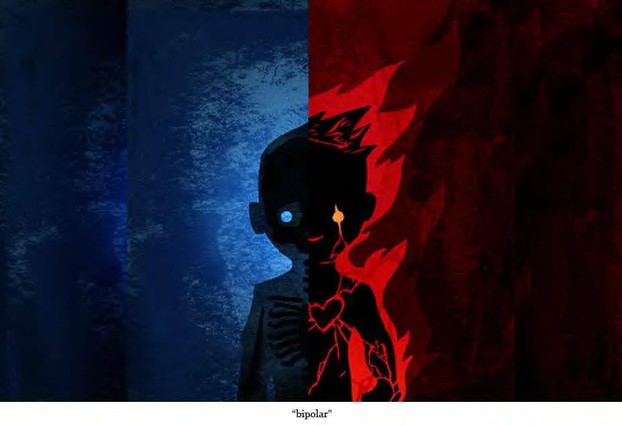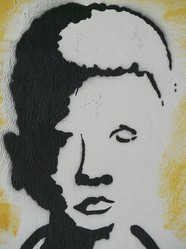Mood disorder affects children just as it does adults. Children react a little differently than adults when they have mood disorder. There are ways to help with mood swings that have helped me along the way with my son. I would like to share what mood disorder is in children and ways to help minimize some of the mood swings.

What is Mood Disorder in Children?
by Angel
Children with mood disorder do not respond to the “normal” ways of parenting. What can you do to effectively parent a child with a mood disorder?
Is this Mood Disorder?
All children become sad or depressed over life situations at times. Losing a loved one, losing a pet, or breaking up with a boyfriend or girlfriend all affect a child emotionally. The love and support of their family gets them through it and over it. A child with mood disorder has symptoms that occur and keep occurring. It often goes undiagnosed because it mimics normal emotional mood swings and behavior issues associated with growing up. If not treated, mood disorder can lead to substance abuse, school failure, self destructive behavior, and even suicide.
 |
Most Common Symptoms of Mood Disorder in Children
- Frequently complains of physical problems though none are there
- Lack of enthusiasm
- Constant crying
- Constant negative statements about themselves
- Self destructive behavior
- Does not experience joy from things that other children their age do
- Disruptive behavior
- Suicidal threats
- Increased energy with decreased sleep
- Poor judgement
- Inflated self esteem
- Sleep too much
- Talks about hating themselves
- aggressive behavior
- Hyperactive
- Impulsive
- Oppositional defiant
- Unpredictable emotional changes
These symptoms may occur at different times. During times of depression your child may sleep too much. During times of mania they may not want to sleep at all.
If your child exhibits symptoms such as these for extended periods of time, it may be time to contact your Pediatrician. Make sure a full evaluation is done by a licensed Pediatric Psychologist or Psychiatrist.
True Child Within
My Story
My son started to exhibit symptoms of mood disorder along with ADHD and Aspergers Syndrome around the age of 4. It is hard sometimes to distinguish exactly which one of these disorders is present. Our psychiatrist explained that she diagnoses children this young under the umbrella of ADHD with symptoms of bipolar or mood disorder etc. Their brains have not yet completely developed and some of these symptoms and behaviors will change over time as they grow. We have seen that the symptoms of mood disorder are more apparent as my son gets older.
My son can be crying his eyes out one minute and complaining that no one loves him and then jump to laughing uncontrollably with his sister over something. It is very frustrating for me as a parent because none of the traditional methods of parenting seem to work with him. These are the things I do with my other three children. I have to step back and try different things with my son.
What Can You Do?
Are you at your wits end with trying to parent this child? None of the traditional forms of parenting seem to work. Try some of these things with your child and for yourself. They have worked for me and other parents that I frequently talk to in the same situation.
1. Behavioral Therapy
My number one suggestion in properly parenting a child with mood disorder is to take them to regular behavior therapy appointments, sit in on the sessions, and stick to what the psychologist talks about in those sessions. Sounds simple doesn't it. It is not that simple. I have not always taken my son to see a behavioral therapist like I should have. I would miss appointments due to other obligations or just stop taking him for periods of time. There were times I felt like none of it was helping or it just became too much of a hassle. These appointments are usually weekly and sometimes multiple times per week. Not to mention the cost of the appointments. Sure insurance paid for the majority of it but $40 co-pay once or twice a week adds up. During hard times, this was one of the things that would get cut. Try your best to stick to the appointments. They really do help. Pay attention to the therapist and work with them. What good does it do to take your child if you are not going to reinforce what is being discussed. I have learned the hard way.
 |
| Zen and the Art of Relaxation |
2. Relaxation Techniques
Work to teach your child relaxation techniques. Your behavioral therapist may have some suggestions on this as well. Teach them to relax when things get crazy. Explosive behavior will not get them anywhere and does no good. This is a hard one for my son. He tends to explode before he thinks. I have to step in and work him through some exercises to calm down. He knows what to do since we have gone over it. It takes me to initiate it. My hopes are that he will soon learn to do these himself the more he practices.
3. Make Sure Medication is Taken
Strictly enforce them taking their medication. My son is getting to where he does not want to take his medication. I have caught him hiding it from me to give me the impression he has taken it. I have caught him spitting it out in the trash can. These medications help them. We have tried going without medication for my son. It doesn't work out well for anyone. Especially him.
4. Have Patience
Have patience with them and try not to lose your temper. This is a hard one for me. I am hot headed to start with and to see my son do some of the things he does really sets me off. I have to step back, take a deep breath and slowly work through whatever the issue is at the moment. Threatening does no good with a child who has a mood disorder. Telling my son that he will lose his Play Station if he keeps on doing whatever it is that he is doing just causes him to be even more explosive. I have learned to just take it away from him and explain why I did. I get a much better response out of him. It is still not pleasant but not as disruptive. I tell him that I have it already and we work through how he will earn it back. Bottom line in all this is to have the patience to think through these things and take small steps to properly correcting them.
A Book on My Shelf
 |
| Patience: A Little Book of Inner Strength (Pocket Wisdom Series) Only $14.94 |
5. Pay Attention to Their Interest in Experimenting with Drugs and Alcohol
Pay close attention to their interest in experimenting with drugs and alcohol. A teenager with a mood disorder will have a much harder time with drugs than a child without. It is not good for any child period. A child with mood disorder may become addicted more quickly. They will exhibit more severe symptoms of depression than they already have when using drugs.
6. Make Sure They Get Enough Sleep
Make sure they get an appropriate amount of sleep. If my son does not get at least ten hours of sleep per night he is horrible to deal with the next day. All of his symptoms are exaggerated.
7. Take Time for Yourself
Parenting a child with a mood disorder is stressful any way you look at it. If you don't take time for yourself, you will drive yourself crazy. Not only that, you will end up sick. You won't have the energy to parent your child if you don't do things for yourself and de-stress. Do something for yourself daily. Go to a movie. Get a manicure or pedicure. Take a nap. Anything to get away from the stresses of what is going on in your home. I write to help get things off my mind. It relaxes me. I also go for walks and take long baths. You come up with two or three things that you enjoy doing and do them. It will benefit your child too.
8. De-Clutter Your Life
Feng Shui your home. I know this sounds crazy. If you de-clutter things and have organization in your home it will help your child as well. I had to do it to believe it. It was suggested by one of his therapists. I simplified things and got rid of excessive mess. Things that are just not needed have to go. Pick room colors that will help your child's mood. Don't use depressing colors. My son's room is a bright blue. The rest of our home also has bright cheery colors. He even talks about how much he enjoys being in certain rooms because it makes him feel better. I couldn't ask for anything any better than that. I would paint a room pink if he wanted me too!
 |
| Feng Shui Your Life |
Great Books for Parents of Children with Mood Disorder
 |  |  |
| The Bipolar Child: The Definitive and... | The Ups and Downs of Raising a Bipola... | What Works for Bipolar Kids: Help and... |
You Are Not Alone
You are not alone in this. Out of 100,000 children, 2-3000 have a mood disorder. Their parents are going through the same things as you and I. Look for support groups and join them. It helps to meet other parents and know that they also see the same things as you.
Parents of a child with a mood disorder end up feeling guilty, shameful, and inadequate. You love your child very much and you don't know what to do sometimes. Understand that love will not cure your child of this. You have to teach your child the correct coping skills to get through life with this disorder.
Our story is very much the same as others going through this. I, the parent, also have a mood disorder. More than 80% of children with this disorder come from parents with the same disorder. It is twice as hard for me to follow some of these guidelines or always do the right things. I too am dealing with it along with my son. I have to make myself lists and write these things down to make sure I follow them. It is not easy but I do it. I do it because it is best for my son.
Related Articles
You might also like
How to deal with Bipolar (Mood) DisorderThere is Hope! Bipolar Disorder can be difficult to deal with, but with the ...
Bipolar Disorder-Its Diagnostic DilemmaThe occurrence of bipolar disorder may pose several diagnostic issues.



 Best Vitamin C Serum for Your Skinon 06/21/2012
Best Vitamin C Serum for Your Skinon 06/21/2012
 Is Hyaluronic Acid the Fountain of Youth?on 06/17/2012
Is Hyaluronic Acid the Fountain of Youth?on 06/17/2012
 Shiseido Skin Careon 06/10/2012
Shiseido Skin Careon 06/10/2012
 Aerogarden – No Green Thumb Neededon 06/08/2012
Aerogarden – No Green Thumb Neededon 06/08/2012



Comments
It is difficult to handle every day. I figure out new methods of handling things and go with it. My son is a handful! I wondered why I was always so moody and a doctor diagnosed me with mood disorder too. Was an eye opener. Explains a lot about why my son has some of the things he does.. it is passed on to him. So parenting him with my issues is even more difficult.. but what would life be without a few issues..right?!
WOW very good information. It is very challenging to parent facing life in general with conditions such as you've mentioned, stay grounded, sounds like the theme and good advice. It's hard but we parents must remind ourselves what works and that we are in charge of maintaining what works. I appreciate your insightful work, very helpful and validating.
Thanks Jange52 - they are applicable to every day life. I think sometimes we tend to make things harder than they need to be and try so hard to parent the child with bipolar the same way we did our other kids.. when the bipolar child can not get past some of the simplest of things. I have to have a lot of patience and love:) Thanks for reading and commenting.